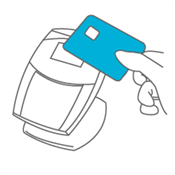Best Credit Card for First-Time Applicants
Ad Disclosure: This article contains references to products from our partners. We receive compensation if you apply or shop through links in our content. You help support CreditDonkey by using our links.
Learn how to get a credit card for the first time. Read this guide to find out which cards are the best and how to avoid common mistakes beginners make.
 |
| © CreditDonkey |
- Cash Back: Chase Freedom Unlimited®
- Travel: Chase Sapphire Preferred®
- College Student: Discover It Student
- Average Credit: Capital One QuicksilverOne Cash Rewards Credit Card (Cash Back)
- Limited Credit: Capital One Platinum Credit Card (No Annual Fee)
- Bad/No Credit: Discover It Secured
Your credit will impact major life decisions like renting or buying a home, getting a car loan, or even landing a job.
Young people are often at a disadvantage because their credit is very limited. Which means the sooner you begin to build a positive credit history, the better for your future.
Getting your first card can be a great first step toward good credit since card companies will report your activity to the three credit bureaus. If you pay your bill on time every month, your credit history will improve.
But if you fall behind in your payments, you can hurt your credit and handicap yourself for years to come.
Your FICO credit score is a number based on your credit history. Scores range from 300-850.
Keep reading for our list of great first time credit cards.
Top Credit Cards for First-Time Applicants
 |
| © CreditDonkey |
- For People with Good Credit: Discover It will match all the cash back you've earned at the end of your first year. This offer is only for new customers. This card earns 5% cash back in bonus categories that change each quarter (up to the quarterly maximum; requires free activation each quarter). All other purchases earn 1% cash back.
- For Cash Back Rewards: Capital One QuicksilverOne earns 1.5% cash back on all purchases. There is a $39 annual fee.
- For Travel: Capital One VentureOne Rewards Credit Card offers a one-time bonus of 20,000 miles if you spend $500 on purchases within three months of account opening. 20,000 miles is equal to $200 in travel. This card earns 1.25 miles per dollar on all purchases. You can redeem miles toward travel purchases on any airline, hotel, or car rental. There is a 0% intro APR on purchases and balance transfers for 15 months. After that, a variable APR, currently 19.99% to 29.99%. There are no foreign transaction fees. There is no annual fee.
- For People with Fair Credit or Limited Credit: Capital One Platinum offers a no annual fee credit card to people with fair credit.
- For People with No Credit or Bad Credit: Discover it Secured Card reports to the 3 major credit bureaus to help you build or rebuild credit with responsible use. The minimum refundable security deposit is $200 (up to the amount Discover approves) and your credit line equals your deposit. Starting at 8 months, Discover will perform automatic monthly reviews based on your responsible credit management across all your credit cards and loans to see if you could qualify to transition to an unsecured line of credit. You will see your FICO credit score for free on your monthly statement and in your online account. There is no annual fee.
But here's where it gets interesting. Discover it® Secured credit card offers rewards: 2% cash back at gas stations and restaurants (on up to $1,000 in combined purchases each quarter); 1% cash back on other purchases. As a promotion for new cardmembers, Discover will match all the cash back you've earned at the end of your first year.
- For New Business: Spark Classic from Capital One offers 1% cash back on every purchase. This card is for business owners with average credit. There is no annual fee.
Before You Apply
Follow these steps to increase your chances of being approved for a first time credit card.
- Know your credit history. First find out if you have any history at all. If you've:
- Been an authorized user on someone else's credit card
- Regularly paid student loans
- Have a car loan
Then you likely have SOME credit. Otherwise, consider a secured credit card (or student card if you're still in school) to start building your history. (More on those options below.)
Tip:You can check your credit score for a fee on the FICO website. Or get a free credit score through Discover. You don't need to be a customer.Knowing your credit can help you decide which cards to apply for.
- Been an authorized user on someone else's credit card
- Compare offers. Credit cards features and terms vary—find the right one for you. See our top recommended starter cards.
TIP: Only apply for one card at a time. Every application is another credit check, which makes a small dent in your credit score.
- List your income. Make sure to list ALL your money sources on the application. Having a steady source of income increases your chances of getting approved. Don't forget: spouse's income, investment returns, trust fund distributions, alimony, and child support income.
- Get approved. Which credit card is easiest to get approved for? Here are some unsecured credit cards that typically have lower approval requirements.
- Surge Mastercard
- Indigo Platinum Mastercard
- Milestone Gold MasterCard
- Surge Mastercard
If you're looking for a card but don't have ANY credit history, here are some ideas you shouldn't ignore.
Best Cards for First Time Holders With NO Credit
Just like it's hard to find your first job without much experience, getting a credit card with little (or no) credit history may take a little work. But you do have some options:
 |
| © CreditDonkey |
Student Cards: Designed with college students in mind, these credit cards for first timers offer fewer perks and tend to have low credit limits.
If you're under 21, you will likely need a co-signer, a requirement since the Credit CARD Act was signed in 2009. If you don't have a co-signer, be prepared to show how you'll be able to pay your monthly bills.
- Discover it Chrome for Students will match all the cash back you've earned at the end of your first year. This offer is only for new customers. This card earns 2% cash back at restaurants and gas stations (on up to $1k in combined purchases every quarter with no quarterly activation required). All other purchases earn 1%. Plus, you can earn $20 statement credit each school year your GPA is 3.0 or higher for up to the next 5 years.
Secured Credit Card: Secured cards require you to set aside money in a bank account that is then used as collateral against any charges you make. In other words, your deposit serves as your line of credit.
Here's how you can get a secured credit card:
- Apply. Fill out the application. For secured cards, you just need to be 18 and won't need a co-signer.
- Deposit Money for the security deposit.
- Use Card Responsibly. You use a secured card like a normal credit card. Pay off your charges on time each month to build credit.
- A secured credit card requires a security deposit. You need to put in a cash deposit. This deposit will usually be your credit limit. This way, if you don't make payments, the card issuer can use your deposit to cover the defaulted amount.
- An unsecured credit card requires no deposit. Your credit limit is based on your credit history. So usually, if you don't have any credit, you cannot be eligible for an unsecured card.
Store Cards: Credit cards tied to a specific retailer are known for low approval standards. You might be able to get one, even if you have a little (or no) credit history.
But be careful: Some cards are only good in the store that issues them, so you may be severely restricted in when, where, and how you use them.
Ready to apply? We've got some things to consider below.
First Time Applicants: What to Keep in Mind
 |
| © CreditDonkey |
Finding the right card will take some legwork. Do your research and keep the following points in mind as you consider signing up for a card:
Don't let rejection discourage you: With a little or no credit history, you may not get approved for the first traditional, unsecured card you come across.
Consider these smart fixes to build up your credit:
- Get a cosigner. A cosigner is someone who agrees to be responsible for your debt if you don't make payments. Ask a parent or relative if they'd be willing. But remember to use your card responsible so you don't hurt their credit (or your own!)
- Become an authorized user on someone's credit card. Technically, this isn't your own credit card since the account holder is responsible for payments. But you'll get a card (with your name on it) to make purchases.
The best part: you can start building credit…as long as the cardholder makes timely payments.
Future prospects: If you are approved, your first card will come with some unfavorable terms. There's likely to be a fee, high interest rates, and restrictive terms and limits.
After a year of paying your bill on time and staying within your credit limit, you should qualify for a credit card with rewards and better terms.
So keep your eye out for current credit card deals when that first year comes to a close.
Low limits for New Users: You don't need a credit limit of several thousand dollars on your first card. Something in the $500 to $1,000 range is low enough to keep you from getting into serious debt.
Make a few purchases and pay off the balance in full each month to prevent interest from accumulating and establish a pattern of good credit behavior.
- Legally, you just have to be 18 to apply for a credit card. But at that age, you may have a hard time becoming approved for one.
- At less than 21 years old, you will most likely need a parent or guardian cosigner. UNLESS you can prove that you have an independent source of income (allowance from your parents doesn't count).
- For secured credit cards, you just need to be 18 years old. You don't need a cosigner. All you need is the cash for the deposit.
- If you're under 18, you can become an authorized user on an adult's credit card. You will get a credit card in your name.
Don't handcuff yourself with a bad first time credit card. Here's what to watch out for.
First Time Credit: What to Avoid
 |
| © CreditDonkey |
The consequences of choosing the wrong card can be unpleasant. Steer clear of cards that have:
- Excessively high fees: Most credit cards for people with little or no credit history come with fees. But don't let yourself get gouged--an annual fee of $40 or more is probably too steep.
- Excessively high interest rates: Interest rates on cards for new credit card owners are higher because cardholders are seen as high default risks. Fortunately, you can find a card with a reasonable rate.
Percents in the high teens to low 20s is the usual range for an annual percentage rate (APR) - avoid anything much higher than that.
- Cards that don't report to credit agencies: The goal of any first time credit card owner is to establish a good reputation. You can't do that if the credit card issuer doesn't reporting your activity to the credit bureaus.
Looking for ways besides a card to beef up your credit? Read on.
How to Build Credit Without Credit Cards
If you don't qualify for any credit cards right now, don't worry. Here are some smart ways to build up your credit.
 |
| © CreditDonkey |
- Credit builder loan: This type of loan helps you build credit. You are given a loan that is held in a CD account in your name.
Every month, you make a set monthly payment to repay the loan. At the end of the loan term, the loan is paid off and you can access your money (minus interest and fees).
Apply for a Credit Builder Account at Self
- Get the Credit Builder Account that helps build credit today!
- Choose the plan that fits within your budget
- Monthly payments are reported to the three major credit bureaus.
- Student loan: You don't need a credit score or a parent co-signer to take out a federal student loan. You'll build credit as soon as you start making repayments.
- Co-sign a loan: You'll need a co-signer for things like auto loan. But you will build credit by making monthly payments.
- Report your rent: Landlords don't typically report rent payments to credit bureaus. But with services like Rental Kharma or Rent Reporters, YOU can.
They then verify the payments with your landlord and report your rent history to the credit bureaus on your behalf.
Bottom Line
A first time credit card is a great first step to building your credit history. Do your research to find the right card for you—and ones to avoid. Even if you're rejected, there are still ways to build your credit.
And remember: your credit history will follow you everywhere. Pay off your balance and make timely payments to earn access to cards with better perks and rates.
Leah Norris is a research analyst at CreditDonkey, a credit card comparison and reviews website. Write to Leah Norris at leah@creditdonkey.com. Follow us on Twitter and Facebook for our latest posts.
Note: This website is made possible through financial relationships with some of the products and services mentioned on this site. We may receive compensation if you shop through links in our content. You do not have to use our links, but you help support CreditDonkey if you do.
Editorial Note: Any opinions, analyses, reviews or recommendations expressed in this article are those of the author's alone, and have not been reviewed, approved or otherwise endorsed by any card issuer. This site may be compensated through the Advertiser's affiliate programs.
Editorial Note: This content is not provided by Chase. Any opinions, analyses, reviews or recommendations expressed in this article are those of the author's alone, and have not been reviewed, approved or otherwise endorsed by Chase. This site may be compensated through the Advertiser's affiliate programs.
Editorial Note: This content is not provided by Discover. Any opinions, analyses, reviews or recommendations expressed in this article are those of the author's alone, and have not been reviewed, approved or otherwise endorsed by Discover.
Editorial Note: This content is not provided by Capital One. Any opinions, analyses, reviews or recommendations expressed in this article are those of the author's alone, and have not been reviewed, approved or otherwise endorsed by Capital One.
Disclaimer: The information for the Discover it® Cash Back, Discover it® Student Cash Back, Spark Classic from Capital One, Capital One QuicksilverOne Cash Rewards Credit Card, Capital One VentureOne Rewards Credit Card, Capital One Platinum Credit Card, Discover it® Secured, and Discover it® Student Chrome has been collected independently by CreditDonkey. The card details on this page have not been reviewed or provided by the card issuer.
Credit Builder Accounts & Certificates of Deposit made/held by Lead Bank, Sunrise Banks, N.A., SouthState Bank, N.A., First Century Bank, N.A., each Member FDIC. Subject to credit approval. Self Secured Visa® Credit Card issued by Lead Bank or SouthState Bank, N.A., each Member FDIC. See self.inc for details.
|
|
|














